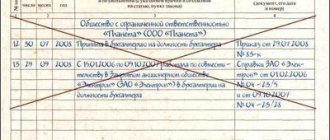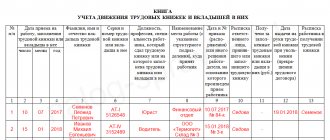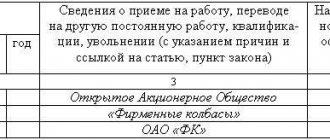At work, I often have to search for the necessary data on the Internet, and lately, I regularly come across articles with headlines about the abolition of work records. As far as I understand, we are not talking about a complete refusal to maintain this document, but about creating a work book in electronic form.
To be honest, I don’t like this idea at all. There are several reasons, and the main one is that in Russia there are almost no services that work fully and are truly useful.
Even on the now popular State Services website, glitches regularly occur, and locally, in regions, officials and in general do not take into account actions performed using the electronic service.
Unfortunately, the likelihood that replacing paper forms with electronic ones will actually be effective and efficient is not very high. However, let's look at this issue in the article.
When to cancel TC: latest news on the topic
The possibility of abolishing work books has been talked about for the last three decades. This is due, first of all, to the fact that Russia is trying to learn from the experience of other countries in everything. In other states, such documentation is not used and the procedure for recording a person’s work experience occurs in a slightly different order.
In the future, pension provision is established on the basis of information about contributions transferred to the relevant funds.
The Russian Pension Fund of the Russian Federation did not have such opportunities before, therefore, the presence of a work book made it possible to calculate a person’s work experience and accrue state benefits to him. In 2001, the situation changed as data began to be submitted by policyholders in electronic format.
Since data has been received and stored in a special database for more than 17 years, Medvedev announced the need to switch to electronic workbooks. There is no exact answer yet to the question of when paper media will be abolished.
According to preliminary information, this will happen at the beginning of 2019 or in 2020, but the date is still preliminary and there is no more precise information.
Pros and cons of e-books
Using a work book in an electronic version provides certain positive and negative aspects. The advantages include:
- document flow is greatly simplified;
- the process of terminating relations with an employee and upon hiring is accelerated;
- there is no need to restore data regarding the periods when the person worked.
The negative point is that the system in question may be damaged. Insurance is not provided for such cases. As a result, there will be a failure in calculating length of service and accruals will be made incorrectly.
What factors prevent you from making a final decision on timing?
It would seem that it is possible to make a decision as early as 2020 and issue a corresponding order to abandon paper forms.
For example, you can use the personal account of the State Services portal as a base and add personal data about work activity there for each Russian. Despite the complexity of completing the task, these actions are quite accessible.
In reality, everything is not as simple as it seems and there are some points that do not allow you to quickly make a decision. The fact is that many Russians began working before 2001 and for them, a paper form is the only document that will confirm that a citizen has the necessary work experience and obtain the right to state benefits.
Some Russians even have old (Soviet) model books. In this regard, a complete refusal to maintain paper documentation is not yet possible. You can learn more about this issue from the video:
What is a work book
A work book is a basic paper document that every working citizen of the Russian Federation is required to have. It contains information about the professional activities of the owner.
The circulation of this document has a long history in our country. It appeared almost simultaneously with the Soviet regime. According to the law of those times, every worker was required to have a work book. Some time later, it became necessary for non-working citizens to obtain this document. He then served as an identity card.
Reference! Soviet peasants on collective farms did not have this document for a long time. Only in 1975 did specially designed paper for collective farmers appear.
Work books have repeatedly changed in their design and order of execution. After the collapse of the USSR, Soviet-style books were issued for a long time on the territory of the Russian Federation. Since 2004, citizens who are just starting to work must have a new document. Soviet labor, despite all this, continued to circulate; they were not replaced in any way (except for those cases when a duplicate document was issued due to its loss or damage). If the old-style document runs out of space, then a corresponding insert is purchased for it.
Document functions
It performs several important functions at once, among which the following should be highlighted:
- Recording the professional activity of a citizen . The document must include information about its owner’s education, qualifications, places of work and positions held. In addition, the labor report contains information about the employee’s incentives (previously, entries were made about disciplinary sanctions) and the grounds for dismissal. Thus, the document in question is the main source of information about the citizen’s work activity, work experience and professional qualifications.
- Definition of experience. A work record book or its certified copy is often required to confirm work experience, both general and at a specific place of work. This document is required by the pension fund to assign appropriate payments, by social security authorities when assigning certain benefits, by employment centers, etc.
What actions will be taken in connection with the abolition of paper work books?
Some assumptions have already been voiced by experts in this field. After the abolition of paper forms, enterprises will not have to worry about the safety and maintenance of work books, which will significantly reduce costs in this area.
Additionally, there will be no problems taking into account the insurance length of employees, since for this purpose special information databases will be created, where information about all people with official employment will be placed.
In addition to the described actions, a special web resource with personal accounts will be developed for employers. You will need to visit the portal online after simple registration. Employers will have access and will be able to track the data and make the necessary additions or amendments.
Employees will be able to access the site using their own personal data and an individual password.
What will the abolition of work records lead to? Employer's view
For an employer, a work book is, first of all, a document that confirms the employee’s work activity. There are advantages to eliminating it:
Subscribe to our newsletter
Read us on Yandex.Zen Read us on Telegram
- HR administration costs will be reduced (direct storage, accounting, salaries of HR specialists), human resources will be optimized;
- Responsibility for storing, recording and transferring work books upon dismissal will be removed (remember that the employer keeps the work book until the employee is dismissed, and has no right to treat it carelessly, transfer it to anyone, including the employee, etc. .d.).
However, there are a number of disadvantages:
- confirmation of work experience will only be resumes and recommendations of employees from previous places of employment, which are easy to falsify (in addition, recommendations are subjective and are not always written by enterprise managers);
- The employee can easily hide records about the true reasons for dismissal in the absence of a work book, since they are not reflected anywhere else.
Important: the reason for dismissal may be contained in the dismissal order for the company, but the applicant himself, in order to hide the reasons for dismissal, may not provide such an order, and the previous employer is also not obliged to provide his internal documents to other organizations.
Thus, the employer will hire an employee without having documentary evidence of his length of service and work experience. Despite the fact that many employers are guided, first of all, by the impression from the interview, the diploma, and the employment relationship with the employee can be made urgent and with a mandatory probationary period, most organizations believe in the entries in the work book.
Advantages and disadvantages of switching to electronic workbooks
The introduction of such documentation in electronic format has several advantages and significant advantages. It is worth highlighting the following points:
- The dismissal procedure will be significantly simplified, since the employer will not need to enter data into the document and then hand over the book to the person who resigned. To do this, it will be enough to make a note in your personal account and that’s it;
- it will be easier to make changes to the document if an error is identified or inaccuracies are made when filling out the technical documentation;
- it will be possible to quickly check the track record of the applicant for the position;
- in case of data loss or liquidation of the company, it will not be difficult to restore information;
- employers will not have to deal with storing documents and issuing them to citizens.
In addition to the advantages, there are also some disadvantages of introducing labor forms in electronic form. The disadvantages should be noted:
- when paper documentation is abolished, it will not be easy for the employer to check whether the applicant for the position has various reprimands and unpleasant reasons for dismissal;
- technical problems may arise;
- Some employers may behave incorrectly and write a negative review on the site out of a desire to annoy a former employee.
In any case, the decision has not been finally made and for now paper work books will continue to be used. The transition to electronic media will be officially announced, and special instructions will be provided to those responsible for filling out and processing the documentation for such a plan.
Prospects for the abolition of work records in Russia
Rumors that work books in Russia are about to be abolished have been exciting the minds of fellow citizens for several years now. Thus, specialists from the Ministry of Health and Social Development of the Russian Federation demanded the abolition of work books in Russia back in 2011 and, as an alternative, proposed a transition to an employment contract. At the end of June 2020, specific changes in the area of application of work books were finally announced at the state level. From the beginning of 2020, along with paper labor documents, electronic ones will also come into effect. Information about the labor experience of working citizens will be contained in a unified state database. For some time, paper and electronic work books will duplicate each other, but it is expected that after some time, paper work books will become a thing of the past.
Video: abolition of paper work books
Disadvantages and advantages of canceling work records. Worker's view
At first glance, for an employee, the abolition of work records threatens only disadvantages. The main one is the deprivation of an official document confirming work experience. If the personalized accounting system fails, data may be lost or changed - even if it is completely restored. This means that the employee will have to contact previous employers to confirm their length of service.
Important: in such cases, the Pension Fund authorities must provide assistance to the employee. But, as practice shows, self-recovery of documents is much faster. An employment contract, which is planned to be used as an alternative confirmation of the employee’s work activity, may not be accepted as evidence of length of service, since it is easy to falsify. And in this case, the employee may have to defend his rights in court.
The next disadvantage of canceling work records is the integrity of the employer. If for some reason an unscrupulous employer does not make contributions to the Pension Fund, then the employee will not have proof of length of service.
For the employee, there are also advantages to canceling work records : if the system works ideally, the future pensioner will be deprived of paperwork; he will only need to provide a retirement application.












